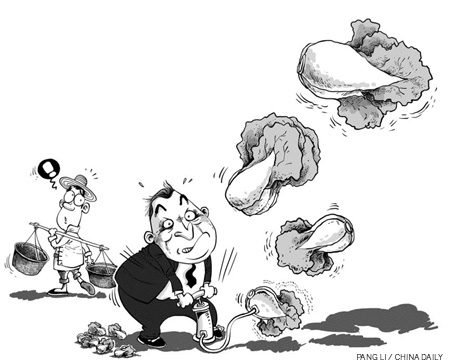View
Price increase has not helped farmers
By Tian Li (China Daily)
Updated: 2010-12-07 08:07
 |
Large Medium Small |
The increase in the prices of agricultural products this year is one of the greatest concerns of the people and the government now. Relevant ministries have announced a series of policies to prevent the prices from rising further. Rising housing prices are still a big concern for the people, but since farm products are daily necessities, the increase in their prices has made life very difficult for them.
Nevertheless, people seem to avoid questions related to their livelihood because they think an increase in the prices of farm products will help farmers, which is a sensitive issue. During the days of planned economy, the loss of farmers' interests because of the demarcation between urban and rural areas had had a great impact on people. Later, one of the real aims of market economy was to eliminate the problem by making primary industries subsidize other industries and pay the farmers their due.
That's why people believe the increase in prices of farm products is one of the results of marketization that has benefited farmers. But have higher prices of farm products really benefited the farmers?
Take the increase in vegetable prices in the first half of this year for example. Though natural disasters such as droughts and spring frost did not cause the prices of farm products in the largest wholesale markets to increase drastically - in fact, prices of some products did not increase at all - vegetables have become dearer by as much as 20 percent compared to that of last year. This means only a small part (or even none) of the extra money that urban residents have paid to buy farm products has been transferred to the farmers. The extra cost actually has gone to middlemen.
This has given rise to two questions: Does marketization aim to transfer the extra profits earned from consumers to middlemen? Can the extra profit made by middlemen indirectly help the overall economy?
The answer to the first question is obviously "no". In fact, it contradicts the original intention. When money from urban consumers is transferred to the wrong group, intervention in the market can produce opposite result.
But the hazard is greater than that. If the process of transferring the extra money from consumers to a targeted group (in this case the wrong group) creates negative utility, it will harm the entire economy, which is the answer to the second question.
As is well known, one of the most important indicators of economic development is value increment, because value has always been the positive function of efficiency. Therefore, we can say that as long as an action improves the overall efficiency of the economic society, it will help increase economic value and vice versa.
Middlemen are supposed to improve the efficiency of commodity transaction. But if substantial social utilities are transferred to this group to an extent that far exceeds the motivation level it deserves, it will create a series of negative utilities that will be transferred to other groups. The most direct demonstration of the ultra-motivation would be the flow of a huge amount of social resources into an area that will not directly improve output efficiency, except perhaps increased production.
Moreover, it would directly lead to a double decline in the efficiency of resource allocation and production. The consequences of such a decline include not only a drop in macroeconomic value, but also indirect harm to the interest of farmers, which is contrary to the original goal of protecting their interests.
Therefore, if the problem of the operational mechanism of the market, especially wholesale market for farm products, is not solved, it will be impossible to protect farmers' interests by merely depending on an increase in the prices of agricultural products. But from a more profound perspective, even if such a mechanism is nearly perfect, encouraging prices to rise will not solve the fundamental problem of farmers.
Instead, it will have negative influence on the entire economy. On one hand, the immoderate increase in the prices of farm products has created chaos. These abnormal phenomena will, in turn, hurt farmers' interests. On the other, if the production efficiency in farms is lower than the national economic average, resources will enter the agricultural sector because of the relatively high price of farm products, which would eventually create negative utility for the overall economy.
In such a case, it would be better to leave the market to decide the prices instead of raising farm products' prices to protect the interests of farmers. Actually, such a mechanism will be more beneficial to farmers in the long run. If the government has no option but to intervene, it should grant subsidies to farmers for two reasons.
First, financial subsidy will not send wrong signals to the market on price. And second, though financial subsidy will result in lower efficiency, it would be more indirect and have fewer negative effects than efforts to raise prices. As long as beneficiaries of the fiscal policy are divided, it will prevent resources from being transferred on a large scale to areas that have low-efficiency levels.
The author is a Harbin-based economist.
